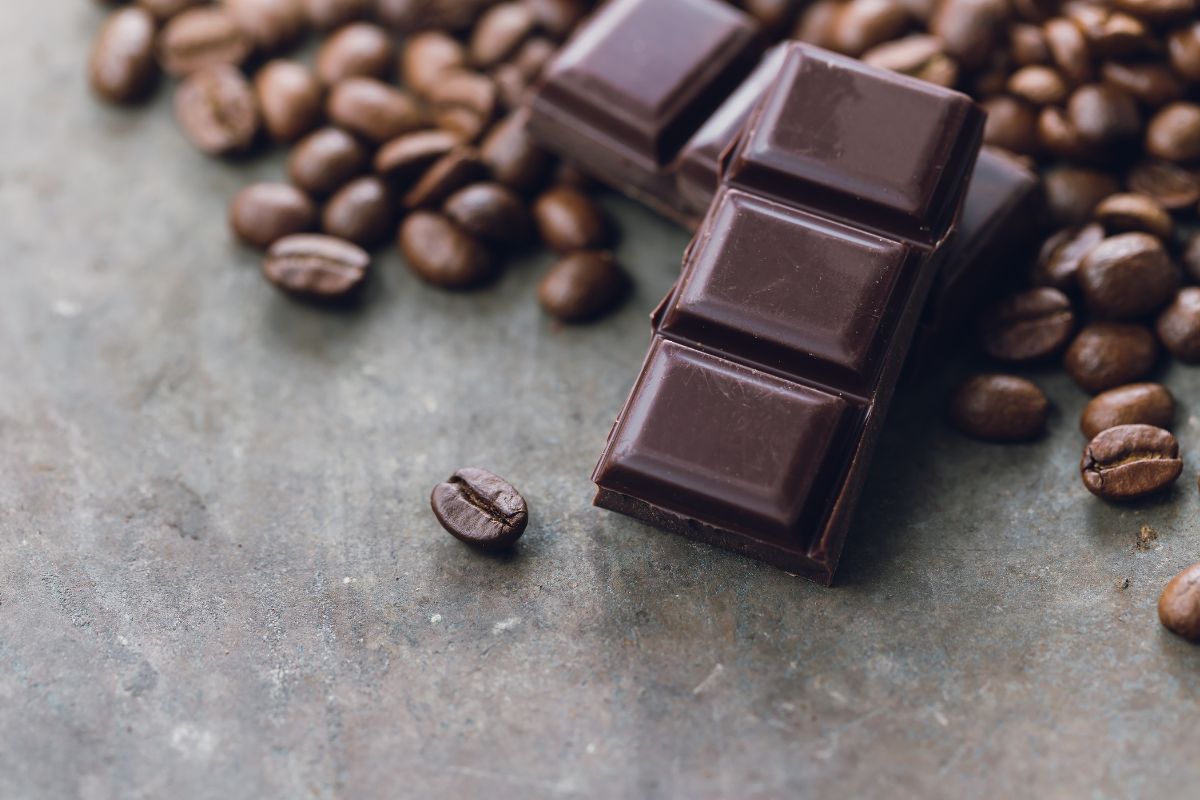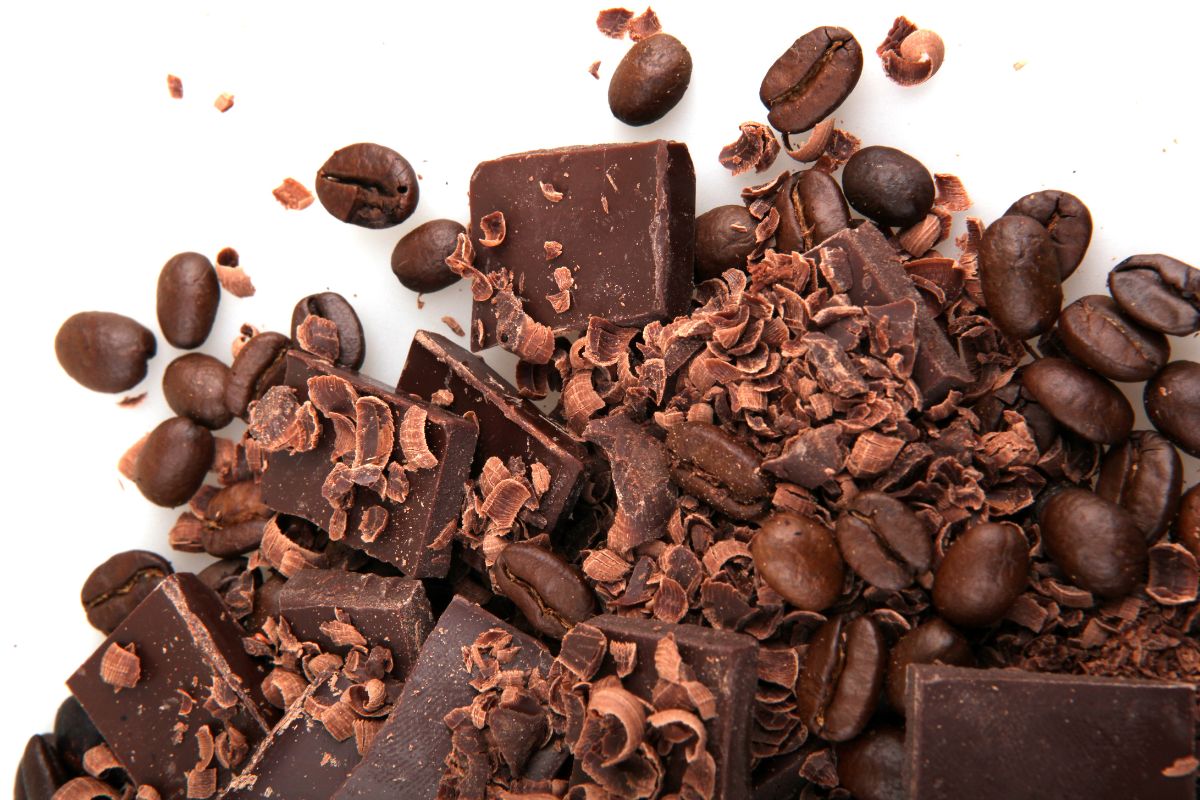Chocolate is just one of those foods that seem to be ubiquitous around the world.
No matter what corner of the globe you’re in. In the same way that pretty much every culture and country has its bread recipe, the same can be said for chocolate too, wherever it shows up.

Part of chocolate’s appeal is its flavors and the many ingredients that go into it. Some, let’s be honest, are a little unhealthier than others.
One of the recent ingredients that have gotten a lot of scrutiny by many health-conscious customers and professionals, besides sugar, is caffeine.
So, how much caffeine does chocolate have, if any? What are its effects, and why is it considered so bad?
We discuss all of this, and more, in this guide on two of the world’s favorite foods and ingredients in today’s highly caffeinated world!
Effects Of Caffeine
So, before we any further into this topic, we should probably explain what caffeine can do it a person. After all, there’s a reason that, so many people are trying to cut down on this particular ingredient, if not cut it out of their diets altogether!
As most people will know, caffeine’s most noticeable effect on the body is how it increases your mental alertness (Just ask anyone in the morning who is barely functioning until they have had a cup of coffee!).
Caffeine increases both your heart rate and your breathing, forcing your body to behave more alert.
Depending on a person’s body, and how quickly their metabolism works, the effects will usually be noticeable within 12 to 30 minutes and can last for up to 12 hours after the caffeine has been consumed.
In small or reasonable quantities, it’s not the worst side effect a drug or ingredient can have, especially when compared to some of the others out there.
However, when consumed in too high quantities, that’s when these effects start becoming detrimental.
Negative Side Effects
When consumed in too high quantities, or consistently and regularly drunk, you’ll find that you’ll likely experience one or more of these symptoms.
- Increased levels of anxiety, restlessness, and irritability.
- Insomnia, or increased trouble sleeping.
- Frequent headaches.
- Increased dizziness, and/or easier to become dizzy from everyday activity.
- Higher/irregular heart rate and blood pressure.
- Increased dependency.
If you find that you experience none of these symptoms, but regularly drink coffee, don’t think you’re exempt from the effects.
Some readers may have recognized that at least some of these symptoms share a lot of similarities with withdrawal symptoms from stimulants.
So there’s a decent chance that normal coffee drinkers would experience at least some of these symptoms that they otherwise would not have if they missed an otherwise regular coffee break
Never forget that even though it is a socially acceptable ingredient to have in food, caffeine is still a stimulant, and is going to have similar effects to other stimulants out there.
Does Chocolate Have Caffeine?
So, it’s no secret that chocolate does contain at least some amount of caffeine. At least, some forms of chocolate contain caffeine.
However, that amount will be different depending on the type of chocolate that you are consuming.
So really, this question shouldn’t be so much about ‘if’ chocolate has coffee, but rather ‘how much’?
How Much Caffeine Does Chocolate Contain?

As we mentioned before, it all comes down to the kind of chocolate that you are eating.
There are generally considered to be 3 main types of chocolate that you can readily purchase, with varying amounts of the main ingredient that makes up chocolate, cocoa.
There is:
- Dark chocolate contains the highest percentage of cocoa (50-90%).
- White chocolate contains much more milk/dairy products and sugar, and less cocoa butter comparatively (20% cocoa butter minimum). White chocolate only contains cocoa butter, rather than cocoa itself.
- Milk chocolate sits in the middle between these extremes, containing more milk or sugar products than dark chocolate, but more cocoa than white chocolate as well (25% minimum of cocoa).
Solid cocoa products naturally contain quite a lot of caffeine in it. So it stands to reason that chocolate with a higher amount of cocoa in it will have higher amounts of caffeine too.
So, following this line to its logical conclusion, dark chocolate has the most amount of caffeine (approximately 29 milligrams of the substance), while milk chocolate can have anywhere from half to three times less caffeine in it (14-10 milligrams).
Comparatively, because white chocolate only has cocoa butter in its mix and not solid cocoa, white chocolate is a completely caffeine-free type of chocolate.
Is It Dangerous?
People might be wondering how much comparative caffeine is compared to coffee, and whether or not it is an unhealthy amount.
To those health-conscious people, don’t worry. Compared to the 94 milligrams of coffee that you’ll get in even a small cup of coffee, the overall amount of caffeine that even dark chocolate, the caffeine-richest variety has, is a third of that.
And don’t assume that by eating that sugar-rich white chocolate, you’re avoiding nasty ingredients and substances in your sweet treats, either!
The high amount of sugar can lead to its nasty health effects, such as obesity, shortness of breath, and cardiovascular disease, to name just a few.
Frequently Asked Questions
Given that dark and milk chocolate can contain some amounts of caffeine, some people may be wondering if they can eat these just before bed, without ruining their sleep patterns.
However, unless you have a particular sensitivity to caffeine products, a small amount of chocolate before bed isn’t going to disrupt your sleeping schedule, so enjoy!
Chocolate will give you a similar energy boost to a cup of coffee, thanks to both the caffeine and the theobromine that you’ll find in chocolate, as well as giving you a small mood boost too!
Final Notes
So, to answer the question we posed in the title, yes, chocolate does contain some amount of caffeine, except for white chocolate.
However, given how small amounts these are, you won’t feel the effects too badly, if you are consuming a healthy amount of them.
- Dealing With Mold on Oyster Mushrooms - April 9, 2024
- What Meat Goes With Pumpkin Ravioli? (Ravishing Ravioli Combos) - March 15, 2024
- What To Dip Cheetos In? (Crunchy Cheese Puffs Concoctions) - March 4, 2024
